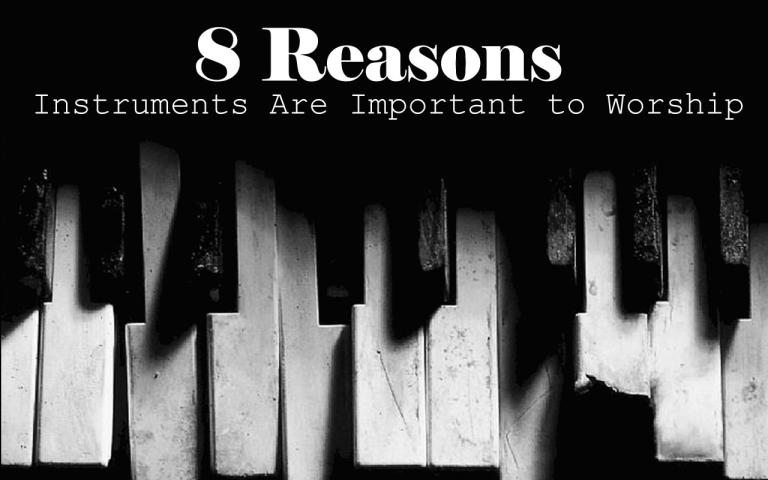Last month one of my fellow Theologues contributors, Austin Maness, wrote up a piece encouraging people to consider worshiping without instruments. There is a rich heritage of vocal and a cappella music in the history of the Christian faith, both in the historical Eastern and Western Churches, and even among many of the Protestant movements.
I think this is a rich tradition.
The human voice is most certainly my favorite instrument, and I personally prefer unaccompanied music and pure chant when I attend worship – most of the time. However, I thought it might be prudent to contribute a few of the things that I consider valuable contributions to the life of the Church through the inclusion of instrumental accompaniment in certain (not all) times of worship. Here are my eight reasons why I support instruments in worship.
1. They invite the cosmos to take part in praise
Christian worship, at its core, is all about God inviting His creation into the divine relationship that we call the Trinity. God has, Himself, ordained that this should be done not only through our own bodies and minds, but also through the material world and the artifacts of human civilization. Christ ordained bread and wine as the central summit around which Christians gather. He commissioned his people to welcome new disciples into his body through the waters of baptism. He healed through spit and mud. Christ entered into the cosmos and used the work of human hands to bring people into the life of divine grace. The Church has continued this tradition. Throughout our history we have fashioned cups, plates, paintings, buildings, candles, shrines, and all manner of objects to help assist us in creating opportunities for worship that honor God through what we see, feel, touch and smell. I believe there is also a place for the artifacts of our society, and the materiality of our world, to help us create sounds of praise.
2. They equip us to praise with more diverse creativity
One of the ways our lives reflect God most powerfully is in the realm of creativity. Just as God created the world, so too do we express our lives and hearts through creativity. One mighty way that this is demonstrated is through the creation of music. Although there is a great range and beauty to the human voice, there are sounds that can be created through other means beyond the voice’s capacity. Instruments create a variety of sounds which help us to more deeply express our God-given creativity.
3. They allow us to bring more forms of beauty
There are few things that express beauty as deeply and richly as music. Every society uses music to express the exquisiteness of the human experience, and the Christian faith has used the beauty and power of music to honor God and unite in praise with one another since its earliest days. With this has come a rich history of prayers and hymns composed with the accompaniment of instruments. I believe this heritage is one of the grandest testimonies of praise that has been left to the world through the generations. To restrict worship to only the voice would diminish the treasury of our tradition and limit the heights of our future praise.
4. The Biblical testimony of instruments in worship
The scriptures are full of musical instruments. When the Lord instructed the Israelites on how to worship in the Torah, he instructed them to play instruments. Kind David appointed special Levites dedicated to playing music in the temple (1 Chronicles 15:16, 19; 16:5, 42; 25:1, 6).This theme is repeated over and over. In the Old Testament, worshippers play trumpets (Exodus 19:16; 20:18; Leviticus 25:9; Judges 3:27; 1 Kings 1:39; Psalm 150:3;) flutes (Genesis 4:21; Job 21:12; Psalm 150:4; David 3:5-15;) horns (Psalms 98:4-6, Psalms 81:3, Exodus 19:13; 2 Chronicles 15:14), harps (Genesis 4:21; 1 Samuel 16:18; Job 30:31; Psalms 43:4; 81:2; 149:3; 150:3; David 3:5-11; Revelation 5:8), lyres (Psalms 33:2; 71:22; 81:2; 108:2; 144:9; David 3:5-10), cymbals (Psalms 150:1-6; 1 Corinthians 13:1, 2 Samuel 6:5, 1 Chronicles 13:8), and tambourines (Psalms 149:3; Isaiah 5:12; see also Genesis 31:27; Exodus 15:20-21; Judges 11:34; 1 Samuel 10:5; 18:6-7; 2 Samuel 6:5, 1 Chronicles 13:8; Job 21:12; Psalms 68:24-25; 81:1-2; 150:4; Isaiah 24:8; 30:32; Jeremiah 31:4).
Not only that, but Psalms 6, 54, 55, 61, 67, and 76 all are explicitly introduced as being accompanied by instruments. Even in the New Testament, we see the apostles going to the temple to worship, where there were undoubtedly instruments used (Acts 3:1). The book of Revelation also speaks of the use of musical instruments as a device used by God, albeit not in the context of regular worship (Revelation 8:7-13).
5. They are consistent with God’s use of the works of human hands
Human beings engaged in creative transactions with the material world, and through these transactions we gave power and meaning to the material world. The world is not an impersonal object. The world we inhabit is very much derived from the meanings we associate with the materiality we form and reform. Our lives are lived in contexts of construction that we participate in giving meaning to. These constructs are seen in the crafting of sounds to make language and music. These constructs are seen in the crafting of homes and tools. They are seen in the food we cook and the beverages we drink. They are seen in the ecosystems we modify, in those we preserve. Even our ideas are constructions of human civilization. Over and over, God has chosen to use these artifacts of human existence to demonstrate love and grace. I don’t believe there is any reason that God would suddenly stop doing that with Christian worship.
6. Instruments are a key way that worship is inculturated
The worship we so often think of as “traditional” is, in fact, the result of generations of inculturation; I have written about this in the past. In many ways, the movement away from instruments by Christians in its early years can be seen as a move to inculturate the faith to the European paradigms of the day. For many people in Western cultural centers, the use of instruments was tied to the participation in cultic pagan rituals. In the same way, the apostles feared that eating meat might send the wrong impression (1 Corinthians 8); likewise, later Church fathers feared the use of instruments might result in a pagan syncretism. As fears about paganism ebbed, so did the rationale for limiting worship to the human voice.
The Catholic Church responded by eventually allowing instruments. When the Reformation came along, banning instruments once again became a tool used by the more radical sects to differentiate themselves.Today, for the first time in the history of the Church, Christianity is becoming centered in the South among people with distinctively non-Western paradigms. In many of these cultures, instruments have a completely different cultural history than what Westerners have been inculturated with. For many, the lack of instruments would communicate a severing of their methods of communication. For example, in many parts of Africa, drums form a component of the cultural norms of communication. Even the non-religious praise of an individual is accompanied by song and drum. To gather to praise God without this element would communicate irreverence, for God would be deprived of a crucial element of the way that culture articulates praise and adoration. Instruments are not always a benefit to worship, but in some cases, to remove them all together would, in effect, be irreverent.
7. Instruments help people express themselves with personal and cultural authenticity
I am not a vocalist. I can carry a tune fairly well, but I am not vocally trained or particularly talented at singing. I am, however, a fairly gifted guitarist. For many years before I became a Catholic, I actually made a good part of my living playing guitar for worship events. I found that I was able to use this skill to connect people to God in ways that I likely never could have if I just tried to sing. Much of the ministry I ran was made up of musicians in rock bands. We would get together and make music, and out of that collaboration, we found our authentic voice of worship. I still find I praise God better with six strings than I do without. This is, of course, not the case for everyone, but I think it’s an important element to highlight.
8. Instruments give a greater vocabulary of praise
Music is a language. It communicates beauty. It communicates pain. It communicates joy. It communicates awe. It communicates wonder. It urges us forward. It holds us back. It builds anticipation. It brings back old memories. It is a powerful language. Instruments help deepen the vocabulary of the language. There are simply some things that cannot be done with the human voice alone. Why limit our praise?
As I mentioned at the beginning of this piece, I do not believe that instruments should always be used or that they should always be allowed. There are certain cultures and traditions wherein the introduction of instruments would be jarring, irreverent, and would cause undue division. I simply believe that it is important that we keep in mind the myriad contexts and situations that Christians find themselves in. If you are a Christian who doesn’t use instruments, that’s fine. I just want to remind you that it is also fine when others discern that the use of instruments is a profitable thing. I would love to hear whether or not you prefer instruments in your own life and community.
Give me your feedback in the comments below! Thanks. This article originally appeared at Theologues.

















